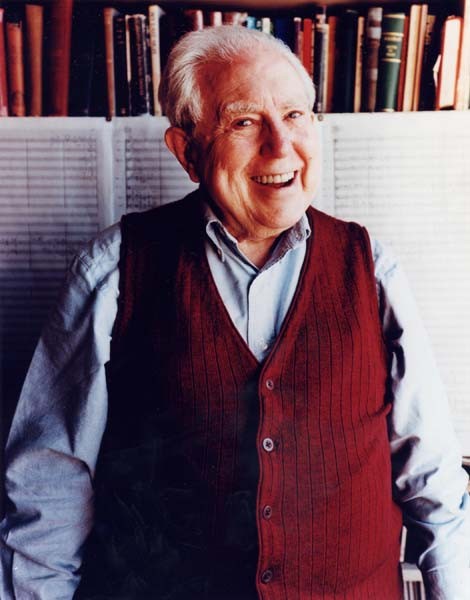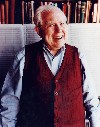Elliott Carter at Tanglewood
Donner und Blitze at Ozawa Hall
By: Charles Giuliano - Jul 24, 2008
Thunder and lightning dramatically prevailed at Tanglewood last night both inside and surrounding Ozawa Hall during performances of works by Elliott Carter. This was particularly evident, as nature resonated with and mimicked art, during the performance of the "Concerto for Orchestra" (1969) conducted with great verve by Oliver Knussen. There were bursts of brass, and flashes of percussion, as the orchestra seemingly conflated with the accents of light flashing though the tall, narrow windows at the back of the stage.
All of the elements of sublime nature and inner agita conspired to squeeze every scintilla of emotion from an epic celebration of the composer, who will turn 100 on December 11. Where, in the past, the annual Festival of Contemporary Music at Tanglewood featured an overview of works and composers, this time, James Levine, the music director of the Boston Symphony Orchestra, decided to concentrate on a single composer. Over two years Levine was involved in selecting the diverse program which started on Sunday and ends this evening. It was a dense schedule of performances, panel discussions, film/ video, and an interview with the composer.
When Levine dropped out of this year's Tanglewood season, shortly after the triumphal critical reception of a concert version of "Les Troyens" by Hector Berlioz, he stated that his greatest regret was not being on hand to share in Carter's birthday celebration. Levine was scheduled to conduct several works as well as mentor the fellows who are involved with this program. Levine is particularly committed to introducing new and contemporary work to the BSO/ Tanglewood audience. The BSO announced this week that the conductor is recovering from successful surgery to remove a kidney and will return to the BSO and Metropolitan Opera by the start of the fall season.
Last night, getting there was not a part of the fun. Even with proper rain gear and umbrellas we were soaked by the time we found seats in Ozawa Hall. There was general admission seating, and while the orchestra seats were fairly full, the balconies were vacant. Contemporary music is a hard sell particularly on a stormy night. On the consecutive nights that we attended the audience, while relatively small, was wildly enthusiastic. It was encouraging to see so many younger people although many of them may have been fellows participating in the festival.
On Tuesday evening the program featured vocal and chamber works. There was an intimate mood as the audience read the poetry while they listened to the performance. It demanded intensive concentration to follow intricate shifts of rhythm and a compelling use of instruments including harpsichord and harp in virtuoso performances. What a contrast when we returned last night for the orchestral works. Instead of straining attentively the music knocked your socks off. There were jolts and gyrations in abundance as Carter used the orchestra less as an instrument and more as a weapon.
The "Concerto for Orchestra" is such a powerful piece that it would surely be a crowd pleaser were it to be offered on the main stage of the Koussevitzky Shed rather than ghettoized in Ozawa Hall performed for a small audience of specialists and the converted. Acknowledging the enthusiasm of the audience Knussen insisted that each section of the orchestra of mostly very young players rise and take a bow. He started with the fabulous percussion section and ended with the violins. It was interesting to observe that as the program progressed different musicians rotated as first chair. So clearly there was an educational process in play. Knussen, who is an enormous man, seemed to bring a compelling warmth, power and command to his handling of the young musicians. He appeared to unleash them allowing them to perform very indecorous music which, at times, evoked the unruly and even violent. But Knussen also masterfully contained, held back, modulated, and then let loose again and again. The Concerto was definitely performed in attack mode.
It is revealing that a Festival of Contemporary Music is focused on a composer who turns 100 in December. Is the notion here that if you live long enoughÂ…? This all too relevantly underscores a pervasive issue in the arts. How to sustain audiences through presenting the familiar and beloved while also educating by constantly introducing new works? It is the equivalent of museums that recycle special exhibitions focused on French Impressionism. Give credit to Levine for understanding these issues and trying to nudge along the audience although very little if any "new music" has been scheduled for the Shed this summer. Levine's special focus, this season, in addition to the Carter week, has been to shoehorn more Opera into the program.
As a part of the Carter celebration the BSO has released his opera in one act "What Next" (1999) in a July, 2006 performance by the Tanglewood Music Center Fellows and Tanglewood Music Center Orchestra conducted by James Levine. The 44 minute production has been released on DVD. With words by Paul Griffiths it conveys a nonsensical automobile accident on the way to a wedding. Nobody has been damaged but the trauma sets in motion a witty and wordy devolution of what should have been a joyous occasion. The absurdity of the drama/ opera owes much to the tradition of Pirandello, Beckett and Genet. In that context it is not particularly unique but, with the music of Carter, is surely intriguing. The sets and costumes are reductive, cartoonish and mostly amusing. While neither great opera nor theatre it is a worthy experiment and significantly the only opera by the composer created when he was 90.
With so much going on, now that we are at the peak of the season, we were able to take in only a sample of what was offered during the Carter celebration. What we encountered was rewarding and enriching. There were many wonderful and compelling moments.
During the Tuesday performance the evening started with "Sonata for Flute, Oboe, Cello and Harpsichord" (1952). It was a light and exotic mix of instruments written in a context that was anything but Baroque. There was the startling congruence of familiar instruments, in a very fresh context, that made you reconsider them. The next work"In the Distance of Sleep" for mezzo-soprano and orchestra (2006) featured the poetry of Wallace Stevens sung by Kate Lindsey. It was a triumph for the singer as she brought passion, range, and insight to the poetry. The audience wildly applauded her performance. After an intermission John Oliver conducted a new work "Mad Regales" for six solo voices (2007). It was set to witty poems by John Ashbery. At the end of the relatively brief piece Oliver stated that a "certain individual" had requested that they repeat the work. The second time round, knowing what to anticipate, the piece was even more compelling.
That "certain individual" rose to his feet, as Carter did after every work, and acknowledged the applause of the audience. It certainly enhanced the historic and emotional significance of the occasion.
Also memorable from the Tuesday evening program was the harp of Ann Hobson Pilot in the ensemble piece "Mosaic." Again it was galvanic to hear the instrument played with such force and precision in the context of contemporary music.
While the Wednesday evening was dominated by the "Concerto for Orchestra" there were other wonderful works performed. The program started with "Three Occasions for Orchestra" conduced by Ryan Wigglesworth. The first "A Celebration of 100 x 150 Notes" presented a series of fanfares. The second piece "Cello Concerto" (2000) featured Fred Sherry in a virtuoso performance. He appeared to love the challenge and opportunity. While acknowledging the applause of the audience he reached over to the music stand and held up his part of the score. This he waved to the audience as if to say, it is not me, but this composition by Carter, which deserves your applause. Indeed.


